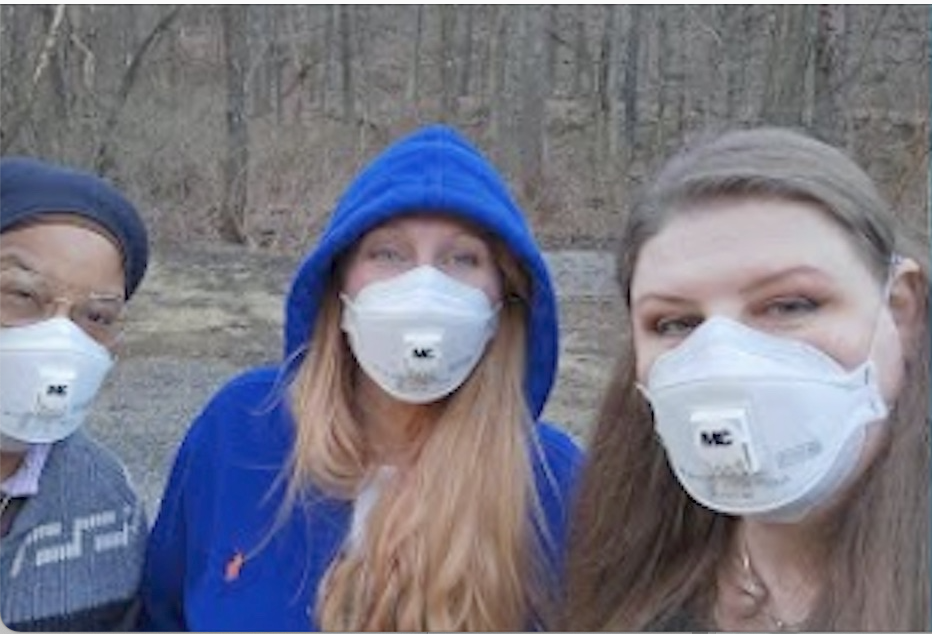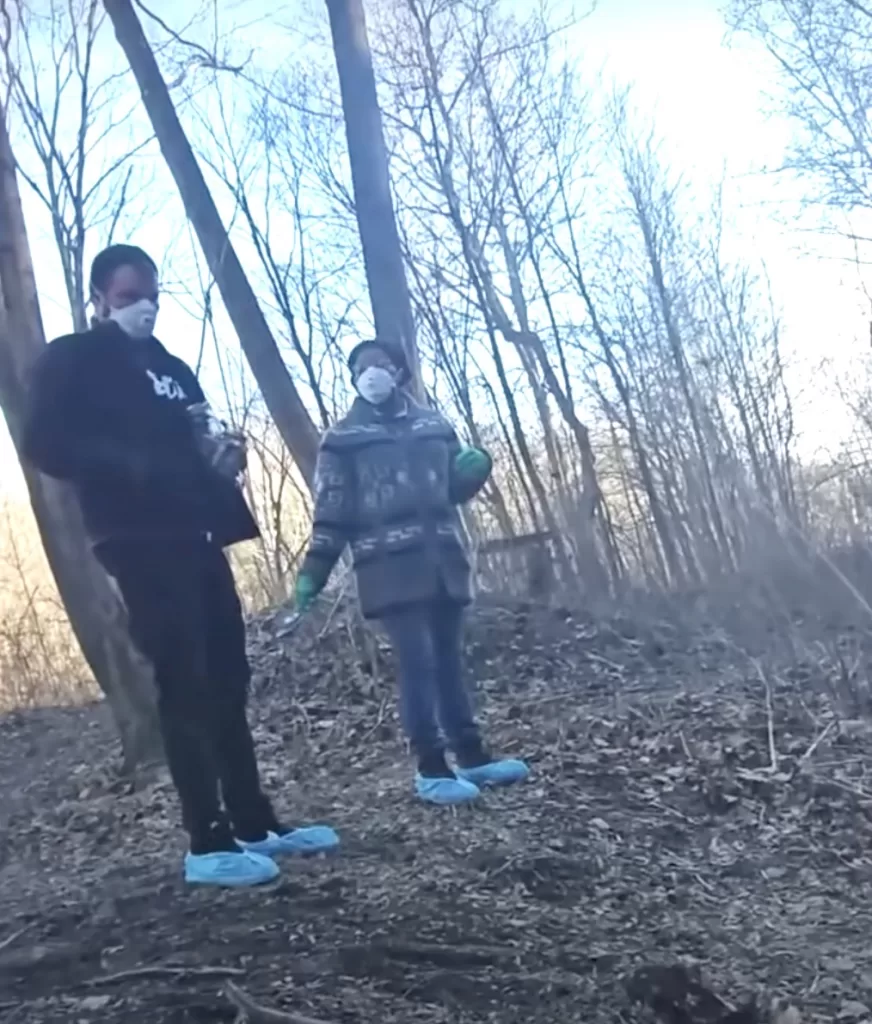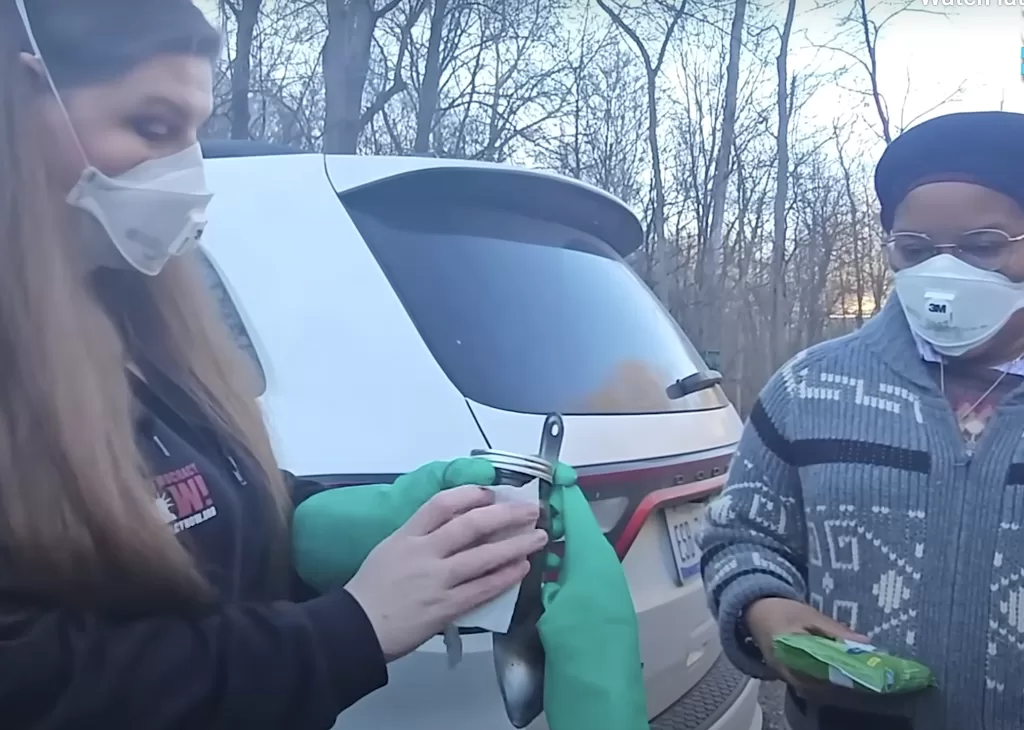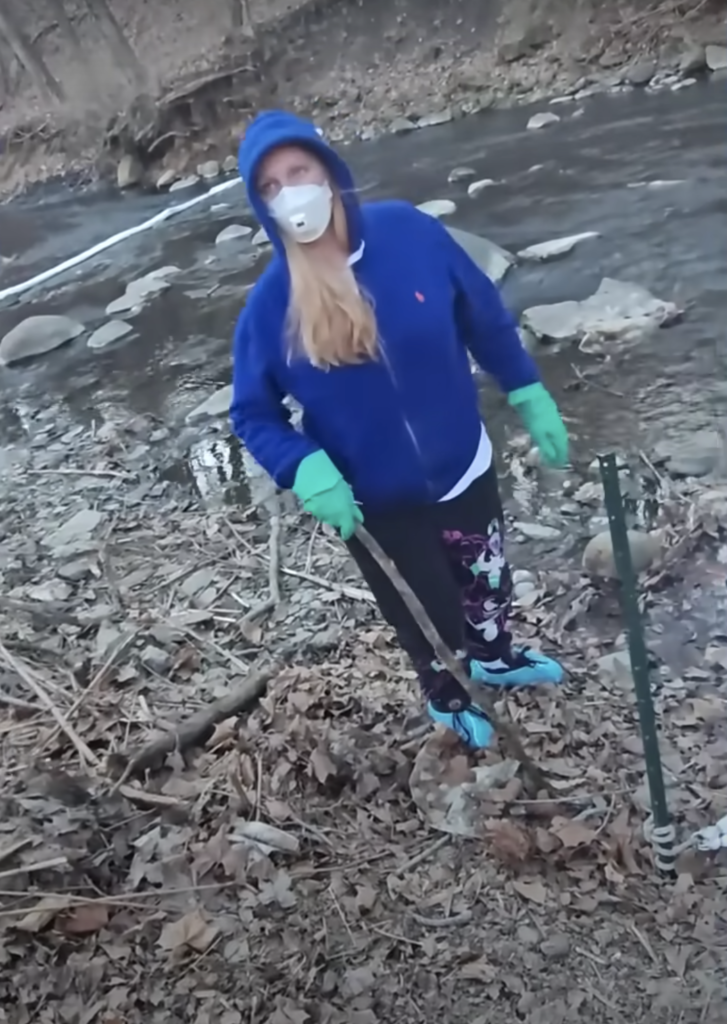
Editor’s note: Below are excerpts from a March 1 discussion hosted by Valerie Jean and Nicole Hill of the People’s Water Board Coalition #Water Wednesday. They speak with Melissa Mays and Nayyirah Shariff from Flint, Michigan, veteran water warriors who went to East Palestine to help residents with organizing steps and collecting data. Watch the entire discussion at https://bit.ly/3FbHUp8/
Valerie Jean: What’s happening on the ground and what did you witness when you got to East Palestine, Ohio?
Melissa Mays: Just a few days after the controlled burn, I was connected with East Palestine residents who were saying completely different things than what the mainstream media was saying…the similarities to the Flint water crisis were undeniable. So I started talking and gathering information and offering resources. I talked to all of these folks who had helped us in Flint and are now trying to help those in East Palestine because they’re telling everybody there that it’s fine. That it’s no big deal, that the water’s safe… but then going back and forth saying, leave your home. Stay in your home. It’s fine. And now, they actually put out a video saying, well, you can smell it, but you have to smell a lot of it for it to actually cause you harm. It’s the same thing they were telling us about the carcinogens in our water in Flint.
The state of Ohio set up a clinic, same as the state of Michigan did, with the people of Flint who developed rashes, and started talking about how it’s in their head, how women are just over emotional…So it’s the same type of thing… also we saw it with Covid, too. Whenever it’s a public health crisis, it’s… “Oh, it’s safe. It’s not safe. This is safe.” It’s not safe.
VJ: Yeah. Nobody knows what to do because they’re getting all this confusing information.
MM: Right. So the residents have already quickly learned that they can’t trust the elected officials and also, most of the testing is done by the railway. And they’re actually stalking the residents, trying to buy them off. So I have this group of women that I’m working with right now to help them with organizing, collecting data. And then they asked if we could come down and do sampling. Then Erin Brokovich asked if we would want to come down when she was doing a town hall and help, so we did. Nayyirah Shariff and I went down there and met with residents, saw what they saw…we went to their homes and collected samples of water and soil. We also went to a creek where they’re doing filtration and aeration. I had reached out to some toxicologists and they gave us some safety information, testing tips, things that we need to do, chain of custody, similar to what we did in Flint. So I’m familiar with that process…Independent testing is how we expose any of it…and then basically, we’re making a training video for residents: how to train to be safe…here’s what you can buy from Walmart so it’s easy to grab stuff…They’re not going to be the most perfect test, but will at least give them an idea. So we talked about how to capture these certain contaminants and how to fill the chain of custody…
I had ordered N95 respirators, which we were told are for VOCs, which is what we were dealing with. It worked in the house and in town. However, when we got to the water, the creek where they were doing the filtration and aeration, we got sick…we were there for less than a half an hour and collected six samples of soil and water and filmed all of it…As soon as we got in there and started collecting these samples, we started getting sick headaches. When we got done after half an hour or so, Nayyirah and I were standing by the truck trying to deal with these samples. She’s like drunk, just standing there…and I go to the truck to get something and I’m standing there. Then my head hurts and we start describing how we physically feel. Then the East Palestine resident with us, Ashley McCullum, who was amazing…started having…[blistering where her face wasn’t covered] because the water, they’re aerating it, was throwing all of the chemicals up in the air.

It smelled so bad. It was hard for us to actually do [samples]…But when it finally came time, we packaged up the last sample and got out of there because we were sick.
VJ: Nayyirah, how important this is, it’s what you guys learned in Flint. How important is it for people to capture the harm that’s being done now? The blood testing, the water testing, for those things to happen now, at this moment?
Nayyirah Shariff: I mean it’s critical because it dissipates from your body as time goes on. So it’s critical for residents to capture who has been exposed, capture that now, through urine and blood tests. And I would say…as an organizer for over 20 years… that in the aftermath of the Flint water crisis, we had organizers from Ferguson, Missouri come speak to residents. The residents of Flint had not been organizers before the advent of the Flint water crisis. So talking about the struggle of what long-term reparations looks like is important, that type of justice…and that burnout happens.
And, you know, looking at the ground through my eyes as an organizer and seeing media converging like ants on a dead body … Yeah, the media was just swarming all over our town…trying to find someone, [looking for an angle]. Just extremely exploitative. So I was trying to give encouragement to residents that the only way you’re going to fight for the long-term justice and resources that you need is through organizing…Also attorneys [have been] converging when disasters happen and the human impact is real. You can’t dance to the media’s tune…the media is kind of like the band leader in residence. They’re like, okay, we’re telling our story here…and they’re still processing what’s happened…And so we’re hopeful that they’re going to be collectively telling our story and fighting for all of the things that people definitely deserve…because the other thing is politicians are basically capitalizing and using this as a prop to kind of fit their own political narrative.
VJ: I mean, that’s what we learned from Flint, right? That any kind of justice has to be organized and won by the people. And even then, it’s a long-haul thing…
NS: It’s going be a pitched battle…I was horrified when we were at the creek…there was a diesel generator there…pumping, sucking up the water and just blowing it out.. And there were people who didn’t have masks on. It was right next to a nature trail. And people were just walking down the trail…taking pictures next to the pump…it was like a tourist destination…I also ended up with a rash across my entire chest that manifested later on that day.


VJ: Melissa, you said you guys were there for half an hour, and if you had that kind of experience, imagine what the residents are going through…
MM: I was nauseous. I almost threw up in my respirator. And [after] we posted some of the videos and people were [saying] oh, they aren’t good enough. And I’m like, these are very expensive respirators that we were told were fine for volatile, organic compounds. However, the fact that w e could smell it through the mask means there’s more than just the VOCs in there, right?…We were told these would be fine for what the chemicals were [according to the EPA] but now there’s like seven, eight, or nine [chemicals] coming out right through independent testing.
[The railroad] gave [people] $1,000 checks, and they have to sign off a whole bunch of rights…people are desperate and they’re signing off on all this stuff. The same with the testing that the railroad, the people responsible for this, are paying for. And then they’re sending in a cleaning crew, which is basically that they have these botanical antibacterial wipes they’re wiping down the walls with… this ain’t Covid.
The company that’s doing it has zero experience with any kind of hazardous waste, any kind of chemical hazards whatsoever. The resident, Ashley, that I’ve been working with…paid $600 out of her pocket to get an independent air test…they picked up vinyl fluoride. They picked up ethanol, like to a point where she’s drunk in her house because it’s so high…But that’s all that they could test for because…these companies aren’t set up for this…And we found out the EPA is not testing for dioxins, which is when you burn off vinyl chloride. That’s the by-product. And that’s what will live in your body for seven to 11 years, and that’s what will go three generations down. And the EPA says, well, we’re not testing for dioxin because…dioxins can come off of barbecues…we were all over that little town, and I didn’t see anybody barbecuing, you know?
Nicole Hill: Disinformation at this point, right?
NS: Norfolk Southern is a multi-billion dollar publicly traded company…there’s a lot of work to be had because of this. I would say this tragedy lays at a bunch of people’s feet. Like the corporate greed…just increasing the number of cars that they’re hauling…The fact that they’re not investing, they’re making a choice to roll with the profits and the stock buybacks instead of making that type of investment into the infrastructure of the trades. There’s also the fact that in the fall, the railway workers wanted to go on strike and they were blocked by Congress because they wanted shorter hours and all of this stuff.
VJ: Better working conditions.
NS: They actually thought that it would wreck the economy. We got all the chatter about a recession happening. It’s like, we’re trying to stop this recession, so railroad workers, ‘‘y’all can go kick rocks,’ you know?
VJ: Right. That’s pretty much what they told them. And then we see what we have here today. Right.
MM: The attorneys were at the town hall. [They] actually showed data that in December of 2022, the railway, when they were doing their budgeting, were saying,…we have $1.1 billion in insurance in case of accidents. And we have $12 billion in liquid assets just in case it goes over the insurance policy…also Norfolk Southern for the past 20 years has basically derailed once every three days. That is the average…so it looks like they would save money by derailing and crashing and poisoning a small town. And not to mention, because air and water move with the weather and all, there’s millions of people that are going to be impacted. And Erin was talking about how the water contamination is going to make its way down to the Gulf of Mexico.
NS: So that’s part of the Mississippi watershed…if you look at a watershed map, it’s making its way to the Mississippi and it’s going down to this logical conclusion of the path of Mississippi, which is the Gulf of Mexico.
NH: What do you think about the idea of transporting the solid waste out to places like Detroit?
MM: So what’s funny is that…I got a text message with a screenshot from one of the East Palestine residents and he said, “Hey, look, what’s heading your way?” We didn’t even know. East Palestine found out before we did that water waste and soil waste were coming to Van Buren and the Detroit area. So…come to find out that nobody in Michigan knew.
I mean, they’re just dumping it in here. And then Texas found out after multiple trucks had already been there. And yes, it needs to go, honestly, they need to be drudging all this up. They need to be removing all this soil. They need to be using masks…and it needs to go somewhere. But that’s a problem because we don’t have a good plan on what to do with these chemicals. First of all, we shouldn’t be putting them on railways through residential or any kind of community. We shouldn’t be using these chemicals. We shouldn’t be hauling them at that weight-1.1 million pounds of vinyl chloride, and there’s other chemicals that train was pulling that they don’t even know what it was.
The residents need bottled water, unfortunately more plastic. But they also need help with PPE. They need masks. They don’t have that down there. And it’s expensive. I went through so much…the PPE stuff, the gloves, the booties so people don’t track the dust in and out of their homes…this is going be there for quite some time. Ashley sent me pictures. They started burning it again by the railroad track last night, and when you burn vinyl chloride, it turns into dioxin so it doesn’t get better…also when it gets hot there, which it does, the heat is also going to cause that reaction. Vinyl-fluoride does not break down. Dioxin is not going to break down and it’s going to be on everything.
The dust in the soot, it’s going to fall down…it’s blowing to all the cities. It’s crossed into Pennsylvania, it’s gone all the way to the south of Ohio. People in Kentucky are having nosebleeds.
But the thing is that people need their stories out and the truth out. So that’s why I talk about independent media and, you know, GoFundMe and everything like that. There are a couple of organizations on the ground, but they don’t seem very trustworthy because people are swooping in. So just look up East Palestine residents and ask them directly, and they’ll tell you what they need and they’ll give you the most up-to-date information that’s not making it out there.
It’s not safe for humans. Period. It’s surreal. But we can’t give up…we can’t give up on anybody. No, these are human beings who did not vote for this. It doesn’t matter what their political affiliation and the finger pointing is. It has to freaking stop. If you want people to care about you, Democrats, stop saying they got what they deserve for voting for Trump. Those children didn’t vote. A lot of people in that town didn’t vote for Trump. And it doesn’t matter. Yes, he rolled back the regulations. But you know what, no Democrats put it back in and also nobody’s stopping it. And the minute it turns into a frigging political finger pointing to Norfolk Southern, who is responsible, they get off the hook.
NS: And what kind of society are we trying to live in that people just die because you didn’t like how they voted…
NH: This isn’t a political issue. This is a human issue. People, regardless of who they are, what their affiliation is, whether they like black people, gay, straight people, it doesn’t matter. They are human beings. This is a human rights issue. And we need to do something to stop these big conglomerates and these supposedly caring and authoritative legislators. And every human being deserves to be safe on this planet.
MM: And nobody voted to be poisoned. They (the corporation) knew that train was wrecking…But the thing is, these corporations have more rights than people, and we’re letting them get away with this. And we’re blaming politicians, yes. Something that legislation can fix, but that’s a long-term problem right now. These people need money. They need a place to live. They need proper testing done, blood urine testing, water testing, dust testing. They need help. And they need PPE and they need to be able to live safely in their homes, like everyone should be able to.
NS: I would say one of the things that really made me have a lot of hope … I’m a person who loves doing protests and demonstrations, loves seeing homemade yard signs, you know, and looking at the signs that residents had, they already have the analysis. They already know that they’re victims of corporate greed. And that…Norfolk Southern is the cause of this corporate greed…so I’m super excited to see what comes next…from the residents as they organize and crystallize their demands and, I’m really ready to support and follow their lead.
VJ: That’s right…as organizers, that’s our job. That’s what we do. We want to make sure we’re following the lead of the people who are most harmed. It’s so important that when people are going there that they understand that. So thank you for pointing it out.
We are going to keep having this conversation. We’re going to really try to understand what the residents need and how you all can help them and how we can help ourselves. And these are really, really hard times. Let’s really try to take care of each other in the best way that we can and try to look out for each other. And thank you, Melissa, Nayyirah, and Nicole Hill for the work you do every day to make the world a better place and to help people. You’re my heroes, all three of you. I’m feeling so emotional about this.
MM: We’re all in this together. I know that because people care and people are, you know, doing everything they can to try to help. That makes me feel like it’s not a lost cause because people care about one another across party lines, state lines, you know, race, gender, all of those things. We’re all in this together. We’re all humans on this planet and let’s try to not blow it up before we’re all done.

